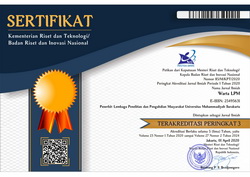Carbohydrate intake, glycemic load and blood glucose levels of diabetes mellitus patients in Community Health Center of Surakarta City
Abstract
Purpose: This study aims to determine the association between carbohydrate intake and glycemic load with fasting blood glucose levels.
Methodology: All selected participants filled and signed the informed consent to follow this cross-sectional study. A total of 65 patient with T2DM were selected using a consecutive sampling method. A total of 65 patients with T2DM aged 45 - 69 years old and were active members of PROLANIS who had medical records from the laboratory examination of the latest fasting blood glucose levels. Inclusion criteria such as has no complications illnes and takes antihyperglycemic drugs or insulin injections. Carbohydrate intake and the glycemic load was determined using the Semi-Quantitative Food Frequency Questionnaire form and fasting blood glucose levels by the medical records of the last laboratory examination results. The statistical analysis used was the Rank Spearman test.
Results: The results showed 70.8%, 61.54%, and 76.92% of respondents had more carbohydrate intake, high glycemic load consumption, and elevated fasting blood glucose levels, respectively. The results of the study found A significant correlation between carbohydrate intake and glycemic load with fasting blood glucose levels were shown by the value of p = 0.047 and p = 0.002.
Application: This research is conducted in Surakarta City at the Community Health Centers of Jayengan, Penumping, Sibela, Pucangsawit, Gajahan, and Manahan.
Downloads
References
Ahmad, M., and Munir, N. (2018). Korelasi antara pelaksanaan prolanis dengan pengendalian kadar gula darah penderita DM tipe 2 di Puskesmas Antang dan Pampang Kota Makassar. Jurnal Ilmiah Kesehatan Diagnosis, 12(3): 339 - 345. eISSN : 2302 - 2531.
Allorerung, D.L., Sekeon, S.A.S., and Joseph, W.B.S. (2016). Hubungan antara umur, jenis kelamin, tingkat pendidikan dengan kejadian dm tipe 2 di puskemas ranotana weru kota manado tahun 2016. J Kesehatan Masyarakat, 2(1): 1–8.
American Diabetes Association. (2019). Lifestyle management: standards medical care in diabetes 2019. Diabetes Care, 42 (1): S46 - S60.
Augustin, L.S.A. et. al. (2015). Glycemic index, glycemic load and glycemic response: an international scientifific consensus summit from the International Carbohydrate Quality Consortium (ICQC). Nutrition, Metabolism & Cardiovascular Diseases, (25): 795-815. doi: http://dx.doi.org/10.1016/j.numecd.2015.05.005.
Barcelo, A., Arredondo, A., Gordillo-Tobar, A., Segovia, J., and Qiang, A. (2017). The cost of diabetes in Latin America and the Caribbean in 2015: Evidence for decision and policy makers. Journal of Global Health, 7(2): 1-15. doi: https://doi:10.7189/jogh.07.020410.
BPJS. (2014). Panduan praktis PROLANIS . Jakarta: BPJS Kesehatan.
Bhupathiraju, S. N. et al. (2014). Glycemic index, glycemic load, and risk of type 2 diabetes: Results from 3 large us cohorts and an updated meta-analysis. Am J Clin Nutr, (100): 218–232.
Burani, J. Gushers dan Tricklers. 2006. Practical use of the glycemic index. Florida: American diabetes association southern regional conference marco island. http://www.ecmstudy.com/uploads/3/1/8/8/31885023/glycemicindex.pdf
Departement of Health. (2009). Sistem kesehatan nasional. Jakarta: Departement of Health RI.
Deshpande, A.D., Harris-Hayes, M., and Schootman, M. (2008). Epidemiology of diabetes and diabetes-related complication. Phys Ther, 88(11): 1254-1264. https://academic.oup.com/ptj/article/88/11/1254/2858146
Dinkes Kota Surakarta. (2019). Profil kesehatan kota surakarta tahun 2018. Surakarta.
Farvid, M. S., Homayouni, F., Shokooni, M., Fallah, A., and Farvid, M. S. (2014). Glycemic index, glycemic load and their association with glycemic control among patients with type 2 diabetes. European Journal of Clinical Nutrition, (68): 459-463. https://www.nature.com/articles/ejcn2013288.pdf
Fearch, K. et al. (2019). Short Report: Epidemiology prospective association between late evening food consumption and risk of prediabetes and diabetes: the Whitehall II cohort study. Diabet Med, 1(36): 1256–1260. doi:https://doi.org/10.1111/dme.13951
Gannon, M. C., and Nuttall, F. Q. (2004). Effect of a high-protein and low-carbohydrate diet on blood glucose control in people with type 2 diabetes. Diabetes, (53): 2357-2382. https://diabetes.diabetesjournals.org/content/diabetes/53/9/2375.full.pdf
Global Diabetes Community. (2019). Carbohydrate and diabetes. https://www.diabetes.co.uk/nutrition/carbohydrates-and-diabetes.html.
Gropper, S.S., and Smith, J. L. (2013). Advance nutrition and human metabolism. 6th ed. Australia: Thomson Wadsworth.
IDF. (2019). IDF diabetes atlas ninth edition 2019. https://www.diabetes.org
Isnaini, N., and Ratnasari. (2018). Faktor risiko mempengaruhi kejadian diabetes tipe 2. Jurnal Keperawatan dan Kebidanan Aisyah, 14 (1): 59 – 68.
Immawati, F.R., and Wirawanni, Y. (2014). Hubungan konsumsi karbohidrat, konsumsi total energi, konsumsi serat, beban glikemik dan latihan jasmani dengan kadar glukosa darah pada pasien diabetes mellitus tipe 2. JNH, 2(3): 1 - 27.
Jia-Yi, D., Lijun, Z., Yong-Hong, Z., and Li-Qiang, Q. (2011). Dietary glycemic index and glycemic load in relation to the risk of type 2 diabetes: A meta-analysis of prospective cohort studies. British Journal of Nutrition, 106: 1649-1654. doi: https://doi.org/10.1017/S000711451100540X.
Kirana, D. N. (2019). Nutrition intake as a fasting plasma glucose regulation control in dmt2 patients. KnE Life Sciences, pages 128–135. doi: https://doi.org/10.18502/kls.v4i10.3837
Komariah and Rahayu, S. (2020). Hubungan usia, jenis kelamin, dan indeks massa tubuh dengan kadar glukosa darah puasa pada pasien diabetes mellitus tipe 2 di Klinik Pratama Rawat Jalan Proklamasi, Depok, Jawa Barat. Jurnal Kesehatan Kusuma Husada, hal. 41 - 50. doi: 10.34035/jk.v11i1.412
Notoatmodjo, S. (2011). Ilmu perilaku kesehatan. Jakarta: PT Rineka Cipta.
Nsiah, K., Shang, V. O., Boateng, K. A., and Mensah, F. O. (2015). Prevalence of metabolic syndrome in type 2 diabetes mellitus patients. International Journal of Applied and Basic Medical Research, 5(2): 133-137. http://www.ijabmr.org
Nuttall, F. Q., Almokayyad, R. M., and Gannon, M. C. (2014). Comparison of a carbohydrate-free diet vs fasting on plasma glucose, insulin and glucagon in type 2 diabetes. Metabolism Clinical and Experimental, (64):253-262. doi: http://doi.org/10.1016/j.metabol.2014.10.004
PERKENI. (2015). Konsensus pengelolaan dan pencegahan diabetes melitus tipe 2 di Indonesia. Jakarta: PB PERKENI.
Ridwanto, M., Indarto, D., and Hanim, D. (2020). Factors affecting fasting blood glucose in patients with type 2 diabetes mellitus. International Journal of Nutrition Sciences, 5(1): 13-18. https://ijns.sums.ac.ir/article_46362_9799e4bcf9d84014573a0406b3fd9308.pdf.
Rimbawan and Siagan, A. (2004). Indeks glikemik pangan. Jakarta : Penebar Swadaya.
Rudi, A., and Kwureh, H. N. (2017). Faktor Risiko Yang Mempengaruhi Kadar Gula Darah Puasa Pada Pengguna Layanan Laboratorium. Wawasan Kesehatan, 3(2): 33–39.
Salma. (2015). Tetap sehat setelah usia 40. Jakarta: Gema Insani.
Simin, S., Schulz, M.B., Rimm, E.B., Manson, J.E., Willet, W.C., and Hu, F.B. (2004). Glycemic index, glycemic load, dietary fiber intake and incidence of type 2 diabetes in younger and middle-aged woman. Am J Clin Nutr, 80: 348-356.
Soviana, E., and Maenasari, D. (2019). Asupan serat, beban glikemik dan kadar glukosa darah pada pasien diabetes mellitus tipe 2. Jurnal Kesehatan, 12(1): 19 - 29. ISSN : 1979 - 7621 eISSN : 2620 - 7761.
Willet, W., J. Manson, and S. Liu. (2002). Glycemic index, glycemic load and risk of type 2 diabetes. Am. J. Clin. Nutr. 76(1): 274S - 280S.
Downloads
Submitted
Published
How to Cite
Issue
Section
License
Copyright (c) 2022 Warta LPM

This work is licensed under a Creative Commons Attribution 4.0 International License.














